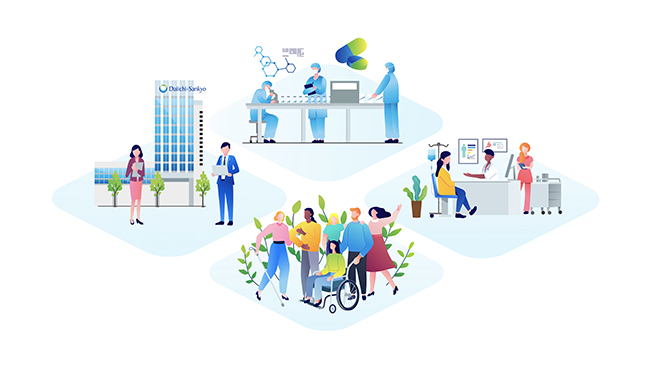The Daiichi Sankyo Group of companies identified eight material issues to be addressed to sustain growth in FY2019, based on the impact on the Group’s medium-to-long-term corporate value enhancement and expectations from society. In FY2020, we set Materiality key performance indicators (KPIs) based on the material issues sorted into two groups: materiality on business and materiality on business foundations.

Eight Material Issues for Value Creation
Creating innovative pharmaceuticals, the basis of our value creation, is our top material Issue. Providing a stable supply of top-quality pharmaceutical products, providing the highest quality medical information, and improving access to healthcare are important for delivering our patients pharmaceuticals created through research and development. To reinforce the foundation of sustainable management, we will promote compliance management, strengthen corporate governance, and promote environmental management, as material issues on business foundations. In addition, we will also continue to promote the success and development of a diverse range of human resources who can bring competitive advantages to the Group’s business operations.
An enlargeable image opens in a separate window
Materiality Identification Process and KPIs* Setting Process
In identifying and sorting material issues, 36 issues were selected from the corporate social responsibility (CSR) perspective in fiscal year (FY) 2015, and were narrowed down to 21 in FY2018. In FY2019, business and governance perspectives were added to the CSR perspective, and medium-to-long-term initiatives and challenges were extracted based on their impact on the Group’s medium-to-long-term corporate value and expectations from society and stakeholders. We prepared a proposal for materiality through discussions with stakeholders, and eight material issues were subsequently identified after review by the Board of Directors.
In FY2020, discussions were held on the setting of "KPI"*1, as indicators for initiatives for each Material issue linked to the 5-year business plan. The KPIs were approved at the meeting of the Board of Directors in March 2021 after several discussions among the members of the Board of Directors in addition to discussions at the Executive Management Committee of the Group. In conjunction with the current 5-year business plan disclosed in April 2021, we announced the long-term targets for each Material issue and the challenges in resolving material issues along with the KPIs.
* Key Performance Indicators
An enlargeable image opens in a separate window
Materiality Management Cycle
Materiality management is promoted under a materiality management system in which the Company’s Corporate Planning Department and the Sustainability Promotion Department serve as the administrative office. In response to changes in the social environment applicable to setting KPIs, the necessity of adding new material issues or making a change to existing material issues was also discussed among the members of the Board of Directors in light of factors including the impact of COVID-19 on society. In FY2023, the progress and evolution of the materiality was reported and discussed twice at the Board of Directors and Executive Management Committee, and it was decided to continue the current materiality and KPIs in FY2024.
An enlargeable image opens in a separate window
Stakeholder Engagement
In February 2021, the Company had an opportunity to exchange opinions on the Value Report with investors during an online meeting hosted by CREDIT SUISSE SECURITIES (JAPAN) LIMITED. The opinions received through these dialogues were referred during the identification of the Materiality KPI, which was disclosed in April 2021.
Since FY2021, we have been holding ESG briefings hosted by the Daiichi Sankyo Group to explain our perspective on ESG management and initiatives, and to exchange opinions with investors. Also we reflected the opinions collected in the briefing and daily interviews in our FY2022 review, and address the most frequently received opinion, "indicators for contribution to patients," with the aim of setting KPIs and targets for FY2023.
We will continue to create multiple opportunities to have dialogues with stakeholders.